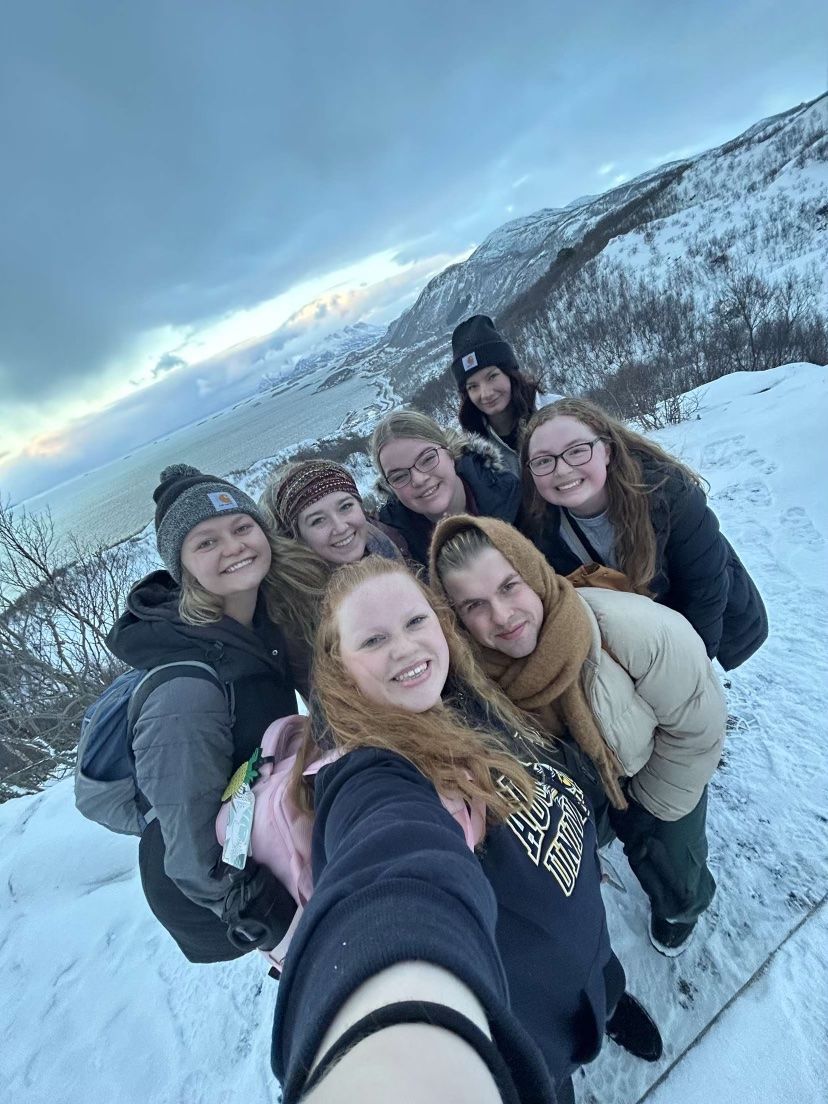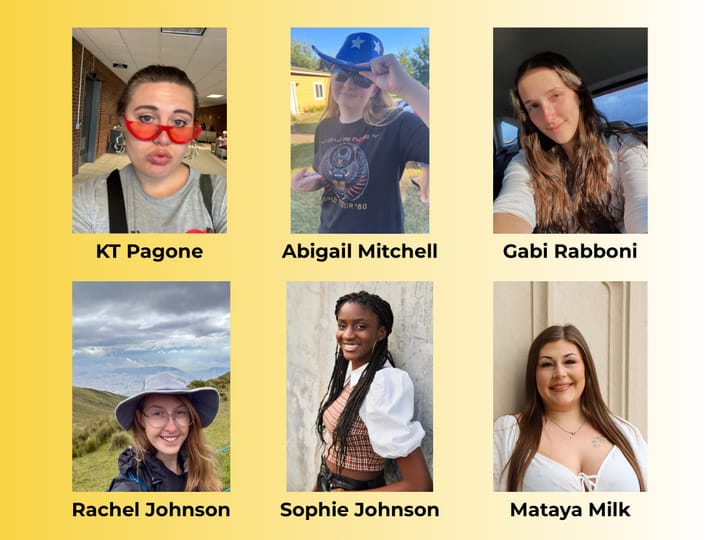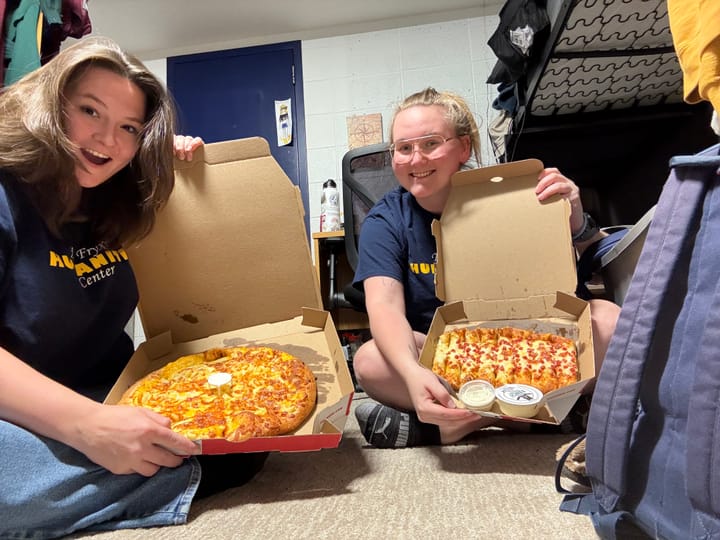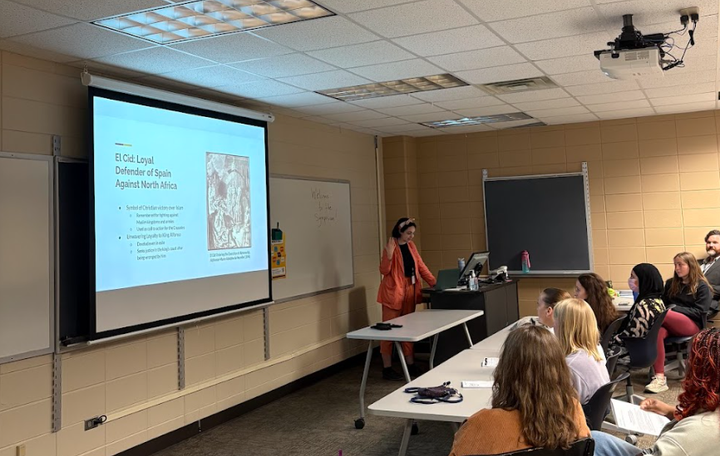Students share stories from J-term study abroad

In one part of the world, Augustana students and faculty exit an airport past midnight to find a dusting of snow before them. They walk, as snowflakes fall, through the quiet streets of Oslo, Norway.
In another part of the world, students weave between stones on the rocky shores of Carrickfergus Castle, the low tide lapping and seabirds calling. One student bends over to pick up a light brown piece of Irish sea glass.
In central America, students enter a Guatemalan jungle full of bright flowers, vibrant trees and birds unlike any they’d ever seen before. Soon, they come to the ancient ruins of the Maya, an indigenous people the students will learn still exist today.
And yet, in another part of the world, students and faculty hike up an active volcano. The view at the top, overlooking the Galapagos Islands and the ocean that surrounds it, is breathtaking.
All they can feel, all at the same time, whether walking through streets or jungle or looking out on the Atlantic or Pacific oceans, is gratitude for being abroad. And this is only a fraction of the students and faculty studying beyond the United States’ borders.
During J-term 2023, 258 Augustana students and 27 faculty members studied abroad in 20 different countries across the globe, including countries like Guatemala, Ireland, Norway, and Ecuador and the Galapagos Islands. They learned about everything from the history of Irish politics to the Norwegian health care system, exploitation in the fair trade coffee economy to the conservation of red crabs in Ecuadorian mangrove estuaries.
Many students and faculty members had conversations with the locals where they were studying. Sophomore Victoria Bartell, who went to Ireland this past January, said that conversations are an important part of Irish nightlife.
“It’s not a party type of scene,” Bartell said. “It’s going and sitting down and having a pint and just talking to people. Locals were very open to having conversations with us and getting to know us. It made it easier to learn about [their conversational culture]. They buy you a drink, not expecting anything besides a conversation.”
Nursing professor Ranae Aukerman said that despite Norwegians sometimes seeming stoic, they are warm and caring people that invite conversation with non-locals.
“The small island we were on — Utsira, with a population of 200 — all knew we were coming,” Aukerman said. “They all wanted to meet our students. They had a whole day planned for us when we got there. They fed us, and they took care of us.”
Junior Caleigh Sanchez, who studied abroad in Guatemala, recalled a particularly memorable conversation she had with her host family after dinner one night.
“The wife said, ‘All we are looking for is the American dream here in Guatemala, but the American dream is hard work,’” Sanchez said. “You can see that these people have worked hard all their lives, but the most heartwarming thing about it all is that they are so happy.”
Sanchez said her trip changed her outlook towards life back in the United States.
“It definitely makes you grateful for the life we have [in South Dakota] because of how hard they’re working and how grateful they are,” Sanchez said. “How can I have everything that I have and not be that happy?”
Biology professor Carrie Olson-Manning said that although her group’s trip to the Galapagos mostly focused on biology, she felt it was important to expose students to their privilege while studying abroad.
“We are headed to this reserve, but we pass all these homes that are clearly very small,” Olson-Manning said. “We get to see the variation in where people live that exposes students to the privileges they have … There are a lot of people living in poverty in Guayaquil. Even if you walk back in the cities in the Galapagos, you see that as well.”
Sanchez said she felt going to Guatemala helped her realize her privilege. The first night staying with her host family, she slept on the floor with an uncomfortable mattress beneath her.
“After a certain point, I realized that the room we were staying in was the kids’ room,” Sanchez said. “For me to be complaining over [the mattress], I was like, ‘No, I have to be as grateful as possible.’”
Bartell said they believe anyone thinking about studying abroad who has the privilege to do so should, as the experiences can change them.
“You’re going to come back a fundamentally different person,” they said.
Sanchez said she believes a change of perspective like the one she experienced was necessary.
“It changes your life,” she said. “You think the world is small if you stay where you are, but you realize when you get out and explore, the world is much bigger in ideas, in cultures and in mindsets.”
For Olson-Manning, she realized the world isn’t as small as it seems.
“Traveling healed something in me that I didn’t remember was broken, like remembering that the world is large and is full of these incredible people and that everywhere you go there is someone you can make a friend with,” Olson-Manning said.



